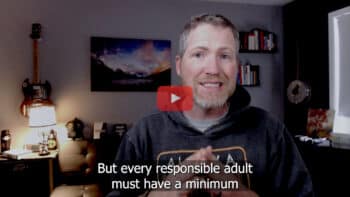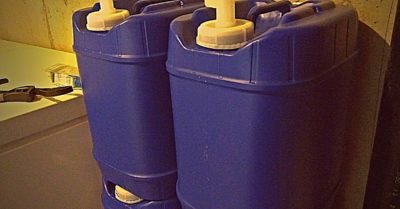My wife and I were living near Atlanta.
Living ordinary lives.
And like millions of others, we had to commute to work.
Five days a week, back and forth…ugh!
30 minutes each way (if lucky), closer to 50+ minutes on average.
But still, life was good.
No real grips (beyond the commuting!)
 Tom Moreland Interchange, a.k.a Spaghetti Junction
Tom Moreland Interchange, a.k.a Spaghetti JunctionWe were doing well in our late twenties.
Both having left small-town life in the Midwest, the BIG city was exciting (once you got used to the pace of life).
Technically, we lived outside of Atlanta, in the suburb of Smyrna.
We liked it; it had a nice downtown.
We both had some student loan debt and a mortgage.
But we weren’t too worried about it.
That’s just what you did, right?
We mostly ate out at restaurants.
And tried (unsuccessfully) to offset our excess calorie intake with local gym memberships.
But most of our spare time was spent watching TV, surfing the internet, or playing video games…
I suppose you could say we were average in every way imaginable.
Maybe even a little boring…
Until an unforeseen event changed EVERYTHING!
It was the catalyst that started it all…
THE CRISIS…
I vividly recall the exact moment.
Something in me snapped.
I was lying wide awake in my bedroom – feeling terrified.
There would be no dreams that night.
My mind raced, filled with dread…
I tried to stay brave. I put a “positive spin on things.”
Telling my wife,
“Not to worry, we’ll figure something out….”
But I didn’t believe my own words.
To keep the worst of the demons at bay, I conjured up a cliché unprepared folks say:
“Focus on how lucky you are,” “Live in the moment,” “Too blessed to be stressed.”
But after THAT night, the magic was gone.
I had seen the sleight-of-hand for what it was, and it could no longer be unseen.
My fundamental beliefs were on shaky ground for the first time in my life.
My rose-colored glasses had been removed, and I saw our modern society for what it really is:
A Grand Illusion.
Our way of life is less secure than the pundits would have us believe.
That long sleepless night, I realized,
“You can’t rely on anyone else when everyone is trying to save themselves.”
Who responds to your emergency if the police are home protecting their own loved ones?
But I’m getting ahead of myself…
What kept me awake was the fact that a city of 4 million people was on the verge of chaos.
The city was completely out of fuel.
Not a drop to be found, with no end in sight.
Here’s an old excerpt from a Reuters article:

Some Atlanta residents said the impact of the shortage is increased because it affects the entire city at once, whereas other economic problems such as home foreclosures affect either individuals or specific communities.
“It’s a little scary. It’s concerning. You see how fragile our whole world and economy is and how reliant we are (on oil),” Stuart Canzeri, 39, a financial planner. –
Without fuel, I couldn’t get to work (it was a 50 min drive).
How long would I remain employed if I stopped showing up?
Sure, 1 human losing their job is no big deal.
But what about a million?
With no fuel, millions would be stuck at home.
It wouldn’t take long for people to start freaking out (they already were).
Fights were already breaking out in gas station lines. People were making a run on the grocery stores, and supplies were getting low.
That’s why I was panicking.
My truck was on fumes (I coasted into the driveway that evening), and my wife’s Jeep was under a quarter tank.
We were both supposed to be at work the next day.
We were also long overdue for a grocery run.
Sure, we had a few calories in the fridge, but not nearly enough.
We had a dilemma:
Do we risk the last of our fuel to search for more fuel or try to stock up on whatever food was left at the grocery store?
At 3 am, I finally got out of bed to search the internet for any updates on the growing crisis.
Hunting urgently for a fuel status report, a random comment, a map marker, or anything!
At first, there was nothing.
Just old leads.
No reliable information worth the risk of leaving.
After about 45 minutes of scouring the internet, some luck…
A single tanker of gas was unloading at a gas station 9 miles away.
Someone left a local blog comment saying,
“Cars were starting to line up.”
I alerted my wife, threw on some jeans, grabbed my 2 empty gas containers, and tore out of the driveway.
That night, I got the gas I needed.
We made it to work and the grocery store the next day.
More fuel started showing up soon after.
The worst-case scenario that played out in my mind that night never materialized…
But this weird, unexpected fuel shortage opened my eyes.
It made me realize just how vulnerable we are…
What would have happened if gas was no longer available for a week? A month? A year? Longer?
What happens if, like in March 2019 in Venezuela, the power grid goes out for a week? A month? A year?
What happens when the economy collapses and we dive into an unemployment nightmare?
This is an event to match or exceed the Great Depression.
Our modern society works pretty well when its modern systems are up and running.
It’s a well-oiled machine providing goods and services an ancient king could never have imagined, such as:
- an endless stream of entertaining “court-jesters” (i.e., actors) at the press of a button
- an unlimited sea of information available on a rock-sized device called a phone
- a soft, comfortable bed made from a spongy material of unknown origin
- a mysterious power called “electricity” available throughout even the poorest peasant’s home
- small indoor aqueducts with knobs to access water when you twist them
- short white thrones with holes in the bottom that take dung away (thank God)
- holes in the floor where warm air magically spews up in most dwellings
- large shiny chariots that run on ancient liquids from deep within the earth
- huge birdlike machines that fly humans at mind-boggling speeds and distances
- on and on and on…
As a society, we have become addicted to these luxuries.
So much so that it’s hard to believe it wasn’t always this way.
We’ve become soft. Complacent.
FRAGILE!
We’ve forgotten it could all go away in a blink of an eye.
If one of society’s main arteries gets severed, the dominoes will fall at an alarming rate.
Our modern world has several weaknesses that can be exploited in many ways.
Flaws that could bring our society to its knees, and only the most resilient among us will survive.
Systems such as the power grid, the fuel chain, the food delivery chain, the water delivery system, and the sanitation system.
It took that sleepless, hot, muggy summer night in Atlanta to discover I was vulnerable.
I was like nearly everyone else.
I was not ready; I knew it, and it scared the hell out of me.
If I didn’t make a change, the next major crisis could be our last.
I was the furthest thing from the hero my family needed me to be.
The 2008 mini-gas crisis was my awakening.
It was the moment I realized I was nearly 100% reliant on others for my survival.
Ever since I’ve made it my mission to live a more resilient life.
‘FRAGILE MASS’ VS ‘RESILIENT FEW’
After the gas shortage, I discovered there are two types of people in the world.
Those who are fragile and those who are resilient.
Nowadays, most people fall squarely into the fragile category.
What I like to call the “fragile masses.”
While a small percentage of people live differently.
Resilient people understand history.
They know bad things happen from time to time and try to live accordingly.

They only keep enough food for a few days.
Because grocery stores are always and forever available, right?
The fragile masses don’t grow gardens or hunt (and mock those who do).
The fragile masses don’t enjoy the outdoors at all.
Much preferring to run in place inside air-conditioned gyms.
The fragile masses tend to have back problems early in life, from sitting at a desk for a living and lounging on a couch as soon as they get home.
And the fragile masses suffer the most when there are disruptions.
They require a smooth society with little to no variations to be happy and successful.
At the first sign of any personal or societal hiccup, they crumble.
The “resilient few” do the opposite.
They love the outdoors and spend as much time as possible in it.
The resilient few do things the hard way ON PURPOSE.
They love DIY projects and camping. They walk their dog rain or shine.
They plan for the worst and pray for the best.
They try to better themselves a little bit each day.
They practice daily gratitude and are thankful for the things they have.
They understand that “comparison is the thief of joy.”
Expensive cars don’t impress and feel more like burdens than gifts once the newness wears off.
The resilient few don’t spend much time on Facebook or the web in general (except to do a bit of research to learn).
The resilient few are tough souls.
Those who can withstand what life throws at them.
They are impervious to shocks and turmoil.
They can handle change with grace and keep their wits about them.
The resilient few understand there are no guarantees in life (except the guarantee of change).
The future is uncertain, and assuming otherwise makes you one of the fragile masses.
Babies are fragile.
They depend on others for their survival, but as adults, we can choose to be fragile or resilient.
I realized that night in 2008 I was one of the “fragile masses.” But I knew I wanted to become one of the “resilient few.”
After years and years of trying to make the transformation (and failing), I finally figured it out.
My wife and I made a few significant changes in our lives, and it worked…
By 2011, we’d moved to Colorado.
We’ve gotten completely out of consumer debt and student loan debt. We’ve stockpiled food and water.
We refinished our basement and did a kitchen remodel (with our own sweat, blood, and tears).
I started doing things like camping regularly.
When my truck’s engine failed, I replaced it myself (with the help of a couple of friends).

Our First Bounty Of Carrots!
My wife began learning how to sew, garden, and can extra produce.
We started backpacking to challenge ourselves to survive the wild for days at a time.
In 2014, we started a family.
We bought a house but paid 20% down with cash this time. We’ve been making large extra payments since.
I changed careers.
Leaving behind my unfulfilling, unrewarding, thankless Maintenance Manager job.
Shifting to become a full-time entrepreneur.
Before becoming resilient, I could have never dreamed of such a “risky” change.
Because of our new resilient way of living, I didn’t have to put up with “The Man’s” B.S. anymore.
I had what I like to call “F.U. money”!
I was no longer a slave to society or a cog in the machine.
Basically, I’ve built a resilient life I was proud of.

Me, My Daughter, and Pup 2014
At this point, I’ve spent the last decade or so focusing on building resiliency in all aspects of my life.
Whether that’s preparing for disasters, being ready for food shortages, financial stability, health improvements, or being a better father.
I believe every aspect of your life can improve when focused on resilience.
I don’t want you to think my wife and I are preparedness “gurus.
Sure, we’ve come a long way, but we’re still early in our journey.
For us, it’s a lifelong process.
It doesn’t happen overnight.
But we’ve discovered the process of becoming more resilient is fun, fulfilling, and comforting.
I believe lasting happiness is made up of two key ingredients: 1) peace of mind and 2) purpose.
Living a resilient life provides an abundance of both.
So, again, I’m not claiming to be the most prepared, resilient person known to man.
I’ve got a lifetime of things to work on …
But that doesn’t matter. That’s not the point.
What matters is:
I’ve discovered the more resilient I become, the happier I am.
You see, now I challenge myself regularly. I tend to do things the “hard way” ON PURPOSE.
Why? Because I believe extreme comfort and luxury are modern diseases.
Humans were not designed to sit around playing video games all day.
We need a challenge. We need a bit of hardship. We need a purpose.
We need to feel like we’re growing through pain and struggles.
And we all have an obligation to our families to provide.
After moving to Colorado, I started turning all my past survival “good intentions” into reality.
- I finished projects
- I learned new skills
- Loved deeper
- Laughed harder
- And slept better at night
Focusing on becoming resilient changed my life in every way.
How Did I Make This Change?
I transformed myself from someone I call Andy into Jack, and it made all the difference.
The mindset shift was the key.
So, let’s look a bit closer at Andy, at Jack, and how such a transformation was made.
But first…
A CALL TO ADVENTURE

You either do it or you don’t.
Becoming resilient is not for everyone.
Time and effort are not something most people want.
Plus, it can be too risky to change.
Why? Because others might think of you differently.
A better, improved – different?
Yes. But differences can be scary.
Now, if you choose to remain in the “fragile masses” category, that’s fine.
The world needs people like you.
But if you’re tired of that life, if you desire something more, if you want to live in a position of strength, then the only path is to choose a call to adventure.
To accept it. Own it.
If this is you, it’s time to meet Andy.
Now, Andy probably has many similar traits to what you have now.
Not entirely, but close enough to make you feel a bit uncomfortable reading it.
MEET FRAGILE ANDY

These things are superficial and don’t get to the heart of the issue.
However, personality-wise, things like dreams, desires, and fears are what matter here.
It was mostly a personality change that fed my ability to build a resilient life.
Not my age, not my religion, not my career, etc.
After the 2008 gas shortage, Andy (me) was motivated.
I had big dreams but no idea how to do them.
Sure, I read a lot about survival and preparedness.
I even tried a few things from time to time.
I recall trying to start a fire with sticks and failing miserably.
I also tried backpacking and freaked myself out when I heard wolves howling in the distance.
I didn’t sleep a wink after that.
I built a backyard garden that produced almost nothing, and the tomatoes we harvested had blight…
So, while I loved the idea of becoming more resilient, it was proving to be a real challenge.
I even went on a giant spending spree trying to solve the problem.
I started slowly because, well, frankly, I didn’t have much money (plus, I’m frugal).
But once I got started, I thought every new purchase was the ticket. The one thing I needed to become resilient…finally.
I was like a heroin addict seeking the next fix.
It wasn’t pretty.
I would buy this or that new survival gadget or fall for the latest “limited-time offer” course, not realizing I’d never even finished the previous one.
This was a vicious cycle of buying, reading, and giving up with minimal traction.
Barely any lasting improvement.
I was dabbling in everything but mastering nothing.
- Fire starting? Yeah, I got about 6 new survival gadgets for that.
- Building a bug-out bag? Done, but way (way) too heavy…
- Food stockpiling? Some, but not nearly enough (and I overpaid)
- Emergency fund? Nope. Still living paycheck to paycheck? – check.
So, while I had a few mild successes in becoming more resilient, it was a far cry from my true potential.
And I knew it.
That’s when I realized I’d been going about it all wrong.
IT’S TIME TO MEET JACK

Andy cares what others think about him.
Jack couldn’t care less.
Andy is distracted by shiny objects.
Jack is focused.
Andy is addicted to the next piece of gear.
Jack is selective in his gear choices.
Andy spends hours mindlessly clicking and skimming online.
Jack values his time.
Jack doesn’t try “a little of this or a little of that.”
He works until the job is done.
He finishes what he starts.
Jack is driven by the need to accomplish something worthwhile.
Jack builds resiliency that sticks before moving on.
Jack’s robust life gives him confidence and freedom—the freedom to do and say and live how he wants, on his own terms.
And this was when I realized and saw the reality for what it was.
Seeing the difference between Andy and Jack was my very own awakening.
Andy was so focused on the end result, but he was quickly overwhelmed and distracted.
He started with enthusiasm but quickly lost confidence and stopped.
Instead, Jack focused on what was right in front of him.
Then the next, building layer upon layer.
Andy wanted the shortcut to hit a home run.
But home runs are the result of lots of daily practice and effort.
When you zoom out, this is all obvious.
But Andy couldn’t see this truth; Jack did.
One of the main benefits of living a resilient life is financial freedom.
But that takes time and commitment.
Andy doesn’t see that; he instead buys lottery tickets.
He’s attracted to shortcuts and hacks.
When I took a step back.
When I looked at my life and my desire to become more resilient, it allowed me to see everything differently.
It was like taking the blinders off. I could see things that were ordinarily invisible.
Jack became successful because he focused on the process.
He cared about the journey just as much as the destination.
The process of showing up.
Doing the hard work.
Not surfing the web all day, not trying another new tactic, but prioritizing what was really important.
The intense focus is on less, not more.
Jack focused on deeper before going wider.
Jack made a choice. He stopped trying to be all things to everyone.
He realized he needed to focus on himself and his family first.
Everything changed when I shifted from thinking and acting like Andy to Jack.
By the end of 2018, I had over $70k in liquid and semi-liquid assets.
I had several months of food stockpiled.
I had a rainwater collection system in place.
I’d stored plenty of ammo and firearms.
I learned how to duck hunt.
I had some advanced medical supplies and was learning how to use them.
Through this process, I became happier, loved my life, and was proud of what I was accomplishing.
I’d gone from living a fragile life (like most) to living a strong, reliant one.
One that keeps getting better every day.
So, I’ll be ready the next time there’s a gas shortage, civil unrest, or any disaster (big or small).
And even if those events never come (and I pray they don’t), it’s still a better way to live.
Because becoming more resilient is not just about getting prepared for disasters.
It’s also a mindset shift, a way to become a better, more confident, and happier version of yourself.
I continue to pursue resiliency because it makes me better.
I worry less and love more.
Final Thoughts
Andy sees opportunities as short-term events where results rarely stick.
He chases fads and hacks and is scared to go deep.
He is scared of hard work.
He dabbles, gets bored, then moves on, never making real progress.
He chases every new shiny survival tool or course, thinking, “This time is different,” but that’s a short-term illusion.
It’s bait from “survival experts,” and Andy always falls for the lie.
The “experts” know Andy all too well (better than he knows himself).
They’re pros at this; they know how to separate Andy from his money.
Selling him pipe dream after pipe dream.
They’re always just one step ahead too. After making promises like,
“This is the last time I fall for it,” the next offer gets him.
The marketers write emails that speak to Andy.
It’s like they’re written for him, preying on his fears and worries.

Jack Climbing Mount Saint Helen’s In 2013
But Jack is different.
Jack understands building a resilient life he’s proud of is not an event; it’s a process, and shortcuts are for suckers.
Jack knows that showing up every day with focus is the key.
Jack knows that things will get easier over time, but you have to get over the hump first.
Andy seeks home runs.
Swings for the fences and whiffs.
Jack hits singles and doubles all day long.
Andy is focused on protecting his ego.
He makes decisions based on what “others might think.”
Jack knows that the ego is the enemy.
Jack doesn’t value bragging rights or basking in “one-ups-man ship.”
He’s content in the life he’s built for his family.
He lets the results speak for themselves.
Jack lives a prioritized, richer, and fuller life. A life full of meaning and pride.
Jack understands that:
“If more information were the answer, we’d all be billionaires with 6 pack abs” – Derek Sivers
Jack knows execution is better than theory.
He rarely buys new products because he values his time.
So, when he does find a product that supports his efforts to make real, meaningful progress, he invests without hesitation.
Andy rarely thinks for himself.
Instead, allowing others to decide what’s best.
Jack makes choices with confidence.
Knowing value when he sees it.
Jack also understands how to be strategic and make small bets along the way.
Taking lessons from small, inconsequential mistakes.
That way, he never goes “all in” on a bad decision.
The good news is you get to choose to operate and think and act like Andy or Jack.
It’s YOUR decision.
- If you’re an Andy and want to be a Jack, we can help with that.
- If you’re already a Jack but want to make it to the next level, we can help with that, too.
- If we can’t help, we’ll tell you and point you in the right direction.
I don’t have all the answers (nobody does, and if they say they do, they’re liars).
What we have here is not for everyone, not the majority, that’s for sure.
This is for the few, the different, and the ones who want to start living a resilient life.
If this sounds interesting to you, check it out here.
Until next time:
Prepare, Adapt & Overcome,
“Just In Case” Jack

"Just in Case" Jack
Co-Founder of TheResilientLife.com and SkilledSurvival.com. Creates content, helps members, and is the visionary behind The Resilient Life’s way of living. Husband, father, mechanical engineer, survivalist, and prepper.
See how to find purpose & fulfilment through living a resilient life.




